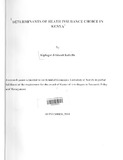Determinants of health insurance choice in Kenya

View/
Date
2011Author
Kiplagat, Isabella J
Type
ThesisLanguage
en_USMetadata
Show full item recordAbstract
In Kenya, the out-of-pocket health expenditure by households accounts for around 36 percent of the total expenditure on health. Large out-of-pocket payments may reduce consumption expenditure on other goods and services and push households into poverty. Recently, health insurance has been considered as one of the possible instruments in reducing impoverishing effects of large out-of-pocket health expenditure. In Kenya, health insurance has limited coverage, yet there are various types of health prepayment schemes. The present study examines the determinants of choice of health insurance schemes in Kenya.
The study is based on utility maximization theory which postulates that individuals choose among alternatives depending upon which offers the-highest total expected utility. Utilizing the 2008-2009 Kenya Demographic Health Survey (KDHS), we estimate a multinomiallogit model and conclude that wealth index, employment status, education level and household size are
.important determinants of health insurance ownership and choice. Also, lack of awareness prevents many from enrolling in any form of health insurance scheme. Policies that improve education attainment, living standards and access to information (awareness) among the Kenyans are likely to increase the demand for all the forms of health insurance schemes.
Publisher
University of Nairobi, Kenya
